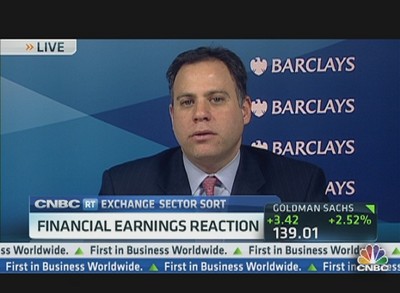What’s Behind Financials’ Post-Election Dive?
By: Katie Little
News Associate
News Associate
Although the financial sector
mirrored the broader market sell-off on Wednesday, one analyst still sees upside
for banks’ book value and earnings despite regulatory uncertainty.
 |
|
Digital Vision |
Getty Images
|
“If you listen to third-quarter
earnings calls, most bank CEOs talked about slowing loan growth, and the number
one reason they gave is corporate borrowers' reluctance to take on additional
leverage in the face of fiscal cliff uncertainty,” said Jason Goldberg, senior
equity analyst at Barclays Capital.
Despite Capitol Hill’s indecision,
banks posted third-quarter earnings that Goldberg described as “generally
constructive.” Both the book value and earnings of most banks grew during the
quarter — a trend that he thinks can continue into next year.
“The majority of banks we cover
beat consensus expectations for the third straight quarter, driven by improved
mortgage and capital markets results,” he said.
Fiscal cliff worries are being
compounded by concerns that the administration will continue its stance on
stronger financial regulation. Before the election, industry participants had
been hopeful that Romney would be softer about financial reform and regulation,
possibly even scaling it back if he were elected.
“The concern now with Obama is
it’s kind of status quo and further implementation of the Dodd-Frank
regulation,” he said.
Although only about one-third of
Dodd-Frank rules have been written, Goldberg forecasts that regulation will not
get worse.
But with doubts surrounding the
fiscal cliff and regulation fogging Wall Street’s clarity, investors are
proceeding with caution.
“Clearly you’re in uncertainty
right now, and bank stocks and stocks in general tend not to like uncertainty,”
he said.
—Written by CNBC.com's Katie
Little. Follow her

No comments:
Post a Comment